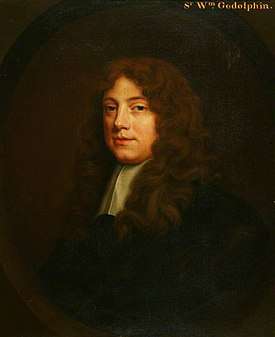William Godolphin (diplomat)
Sir William Godolphin (2 February 1635 – 11 July 1696) was an English diplomat for Charles II and Member of Parliament.

Biography
Godolphin was third but eldest surviving son of Sir William Godolphin (1605–1663) of Spargor, Cornwall—the eldest son (by Judith Meredith) of John Godolphin (the younger brother of Sir William Godolphin (1567–1613)—and Ruth (died before 1658), daughter of Sir John Lambe of East Coulston, Wiltshire.[1][2]
Godolphin was baptised 2 February 1634,[3] and was educated at Westminster School and Christ Church, Oxford, gaining the degrees of Master of Arts in 1661 and Doctor of Civil Law in 1663. He became a follower of Lord Arlington,[1] and in 1665 he was elected in a by-election to Parliament as member for Camelford, however as he went to Spain early the next year he probably never took up his seat.[4]
In 1667, he took part in the negotiations under Sandwich which resulted in a commercial treaty with Spain. He was knighted in 1668, and in 1669 was sent as Envoy Extraordinary to Madrid, becoming Ambassador in 1672.[1] However, in 1678 he came under suspicion of having been converted to Catholicism, and was recalled; but rather than return to England, he then openly declared his Catholicism, and retired to Spain for the remaining two decades of his life.[1] Shortly before he died, he made a declaration empowering his spiritual advisers, including the procurator-general of the Jesuits, to make his will after his death; an Act of Parliament was passed in 1697[5] to declare this and other posthumous wills invalid and to make his nephew Francis and niece Elizabeth heirs on condition that £1,520 was devoted to charity, a charitable act leading ultimately to the foundation of Godolphin and Latymer School, Hammersmith, London and Godolphin School, Salisbury.[6][7][8][9][10]
Samuel Pepys, who met him in 1668, called Godolphin "a very pretty and able person, a man of very fine parts".[1]
Notes
- Leslie 1890, p. 46.
- Venning 2008.
- Leslie 1890, p. 46 cites Maclean, Trigg Minor, ii. 522
- Cruickshanks 1983.
- "1697 (9 Will. 3). c. 19 Confirming and establishing the administration of Sir William Godolphin's goods and chattels". legislation.gov.uk. Parliamentary Archives, Houses of Parliament, London. Retrieved 15 September 2018.
- Leslie 1890, pp. 46–47.
- "Schools: Latymer and Godolphin Schools". British History Online. Institute of Historical Research. Retrieved 15 September 2018.
- "House of Lords Journal Volume 16: 1 April 1698 Pages 253-254". British History Online. Institute of Historical Research. Retrieved 15 September 2018.
- "House of Commons Journal Volume 12: 1 April 1698 Pages 188-189". British History Online. Institute of Historical Research. Retrieved 15 September 2018.
- Douglas, A; Ash, R (eds.). "Elizabeth Godolphin's Will". The Godolphin Book 1726 - 1926. Retrieved 15 September 2018.
References
- Cruickshanks, Eveline (1983). "GODOLPHIN, William (1635-96), of Spargor, St. Mabyn, Cornw.". In Henning, Basil Duke (ed.). The History of Parliament: the House of Commons 1660-1690. Secker & Warburg. Retrieved 8 September 2012.CS1 maint: ref=harv (link)
- Leslie, Stephen (1890). . In Stephen, Leslie; Lee, Sidney (eds.). Dictionary of National Biography. 22. London: Smith, Elder & Co. pp. 46–47.CS1 maint: ref=harv (link)
- Venning, Timothy (October 2008) [2004]. "Godolphin, Sir William (bap. 1635, d. 1696)". Oxford Dictionary of National Biography (online ed.). Oxford University Press. doi:10.1093/ref:odnb/10883. (Subscription or UK public library membership required.)
| Parliament of England | ||
|---|---|---|
| Preceded by Hon. Thomas Coventry Charles Roscarrock |
Member of Parliament for Camelford 1665–1679 With: Hon. Thomas Coventry |
Succeeded by Sir James Smyth William Harbord |